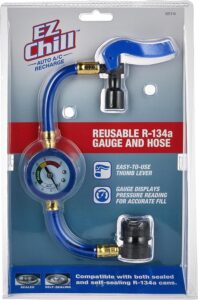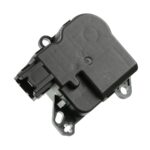A common cause of hot air from the AC could be a faulty compressor or a leak in the system. Addressing these issues promptly can help restore your AC’s cooling efficiency and comfort while driving. Driving in a hot car can be uncomfortable and even dangerous, especially during the summer months.
If your F150 AC is blowing hot air, it may be due to low refrigerant levels. Check the refrigerant and recharge if necessary.
It’s essential to have a functioning AC system in your vehicle to maintain a comfortable cabin temperature. In this blog post, we will explore common reasons why your F150 AC may be blowing hot air and provide solutions to help you stay cool on the road.
Symptoms Of F150 AC Issues

If your F150’s AC is blowing hot air, it could be due to a refrigerant leak, a faulty compressor, or a clogged expansion valve. It’s crucial to address these issues promptly to keep your truck’s interior comfortable.
This common problem can be frustrating, especially during hot summer months. In this section, we will discuss the common symptoms of AC problems in your F150 and why it’s important to address them promptly.
Common Symptoms
Recognizing the common symptoms of AC issues in your F150 can help you diagnose the problem and seek the necessary repairs. Here are some telltale signs that your F150 AC system may not be functioning properly:
- Hot air blowing from the vents when the AC is turned on
- Weak airflow or inconsistent cooling
- Unusual noises coming from the AC system
- AC system not cooling the vehicle as effectively as before
- Strange odors emanating from the vents
If you have noticed any of these symptoms, addressing the AC issues promptly is crucial to avoid further damage and discomfort.
Why is Immediate Action Necessary?
Understanding why AC issues in your F150 matter is essential for maintaining a comfortable driving experience. Here are a few reasons why addressing these issues should be a priority:
- Comfort: A malfunctioning AC system can make driving in hot weather unbearable, leading to discomfort for you and your passengers.
- Safety: A properly functioning AC system helps prevent driver fatigue and keeps you alert on the road, contributing to safer driving conditions.
- Resale value: Maintaining your F150’s AC system in good condition can positively impact its resale value, should you decide to sell or trade-in your vehicle in the future.
- Preventing further damage: Ignoring AC issues can lead to more significant problems down the line, potentially resulting in expensive repairs.
Now that you know the common symptoms of F150 AC issues and why it’s important to address them. Now let’s discuss identifying the problem.
Identifying The Problem
One of the most frustrating issues you can encounter while driving your F150 is the AC blowing hot air. In hot and humid weather, a malfunctioning AC system can make your ride unbearable. Fortunately, identifying the problem can help you resolve the issue quickly and get your AC system back to blowing cold air. Here are some steps to help you identify the problem:
Checking The Refrigerant Level

The refrigerant is the lifeblood of your AC system. Without it, your system won’t be able to produce cold air. If the refrigerant level is low, your AC system will not work correctly. To check the refrigerant level, you will need to use an AC gauge. Attach the gauge to the low-pressure port, which is usually located on the larger AC line. If the pressure is low, you may need to add refrigerant to the system.
Inspecting The Ac Compressor
The AC compressor is responsible for compressing the refrigerant and circulating it through the system. If the compressor is not working correctly, your AC system will not produce cold air. To inspect the compressor, turn on the AC and check the compressor clutch. The clutch should engage and disengage smoothly. If the clutch is not engaging, you may need to replace the compressor.
See video guide to diagonisis compressor –
Examining The Fuse And Relay
The fuse and relay are essential components of the AC system. If either of these is faulty, your AC system will not work correctly. To examine the fuse and relay, locate the fuse box in your F150 and check the AC fuse. If the fuse is blown, replace it with a new one. You can also check the relay by swapping it with a similar one in the fuse box.
By following these steps, you can identify the problem and get your F150 AC system back to blowing cold air. Remember that regular maintenance can help prevent these issues from occurring in the first place. If you are unable to identify the problem, it is best to seek the help of a professional mechanic.
Quick Fixes At Home
If your F150 AC is blowing hot air, don’t fret just yet. There are a few quick fixes you can try at home before taking your truck to a mechanic. Below are some easy solutions to get your AC blowing cool air again.
Refilling Refrigerant
One of the most common reasons for hot air blowing from your AC is low refrigerant levels. You can easily refill the refrigerant yourself by purchasing a DIY kit from an auto parts store or online. Make sure to read the instructions carefully and wear gloves and goggles while handling the refrigerant.
Replacing The Fuse
If your AC is not blowing any air at all, it could be due to a blown fuse. Check your truck’s fuse box and locate the fuse for the AC system. If it’s blown, replace it with a new one of the same amperage. This is a simple fix that only requires a few minutes of your time.
Resetting The Ac System
If the AC system has malfunctioned, resetting it might do the trick. To reset the system, turn off the truck and disconnect the battery for a few minutes. Reconnect the battery and turn the truck on. This will reset the AC system and clear any error codes that might be causing the issue.
By trying these quick fixes at home, you can save time and money on expensive repairs. If none of these solutions work, it’s best to take your F150 to a mechanic for a proper diagnosis and repair.
Professional Solutions
Experience relief from the frustration of your F150 AC blowing hot air with our professional solutions. Our expert team is equipped to diagnose and resolve the issue, ensuring your comfort on the road.
When To Seek Help
If you notice your F150 AC blowing hot air, it’s time to seek professional help.
What To Expect At The Garage
When you take your F150 in for AC repair, expect a thorough inspection and efficient solutions.
When the AC in your F150 starts blowing hot air, it’s crucial to seek timely assistance from professionals. Ignoring the issue can lead to more severe problems down the line. Here is what you need to know about seeking professional help for your F150’s AC.
Preventative Maintenance
Preventative maintenance is crucial for keeping your F150’s AC system in top condition. By staying ahead of potential issues, you can avoid costly repairs and ensure that your AC continues to blow cool air, even during the hottest months.
Regular Checks
Regular checks play a vital role in maintaining the optimal performance of your F150’s AC system. Inspect the refrigerant levels to ensure they are within the recommended range. Check for leaks in the AC system and address any issues promptly. Additionally, clean or replace the cabin air filter at regular intervals to maintain proper airflow and prevent debris from entering the system.
Avoiding Common Pitfalls
One common pitfall is neglecting the AC system until a problem arises. Regularly inspect the AC components to spot any signs of wear and tear. Avoid overworking the AC by setting the temperature to a moderate level, especially during extreme weather conditions. Keep the condenser clean to ensure efficient heat exchange and prevent the system from blowing hot air.
Tools And Materials Needed
When it comes to addressing the issue of your F150 AC blowing hot air, having the right tools and materials is crucial for a successful repair. Whether you are considering a DIY approach or seeking professional help, understanding the necessary items is essential.
For Diy Repairs
For those opting to tackle the problem themselves, having the following tools and materials is key:
- Refrigerant recharge kit: Essential for refilling the refrigerant to restore proper cooling.
- Thermometer: Helps in monitoring the temperature of the air coming from the vents.
- Protective gloves and eyewear: Ensures safety while handling refrigerant and working on the system.
- Socket and wrench set: Necessary for accessing and removing components during the repair process.
- Leak detection kit: Useful for identifying and addressing any refrigerant leaks in the system.
For Professional Repairs
When seeking assistance from a professional, it is important to leave the job in capable hands. The following tools and materials are typically used by professionals:
- AC manifold gauge set: Enables accurate readings of system pressures for diagnostic purposes.
- Vacuum pump: Essential for evacuating and testing the system for leaks before recharging with refrigerant.
- UV dye injection kit: Aids in detecting refrigerant leaks by injecting UV dye into the system.
- Replacement components: Professionals may have access to quality replacement parts and components to ensure a lasting repair.
Safety Considerations
When dealing with the AC system of an F150, it’s crucial to prioritize safety. From handling refrigerant to working with electrical components, following proper safety measures is essential to prevent accidents and ensure a smooth repair process.
Handling Refrigerant
Refrigerant handling requires caution and adherence to safety protocols. Always wear protective goggles and gloves when handling refrigerant to prevent contact with the skin or eyes. Avoid inhaling refrigerant vapor and ensure proper ventilation in the workspace. When removing refrigerant from the system, utilize a recovery machine to capture and store the refrigerant safely. Additionally, be mindful of local regulations regarding the disposal of refrigerant to prevent environmental harm.
Dealing With Electrical Components
When dealing with electrical components, safety is paramount. Before working on the AC system, disconnect the vehicle’s battery to prevent electrical shock. Use insulated tools and avoid working on electrical components in wet conditions. Carefully inspect wiring for any signs of damage and replace any frayed or compromised wires to prevent electrical hazards. When testing electrical connections, ensure the proper use of a multimeter and follow manufacturer guidelines to avoid short circuits or damage to the vehicle’s electrical system.
Frequently Asked Questions
Why Is My Truck Blowing Hot Air With Ac On?
Your truck may blow hot air with AC on due to low refrigerant, a faulty compressor, or a clogged condenser. Have a professional inspect and repair the system to resolve the issue. Regular maintenance can also prevent this problem.
Why Is My F150 Ac Not Blowing Cold?
A common reason for an F150 AC not blowing cold is low refrigerant levels. This can be due to leaks or a faulty compressor. It’s best to have a professional inspect and repair the system to restore proper cooling function.
What To Check If Ac Is Blowing Hot Air?
Check the thermostat settings, air filter, and circuit breaker. Ensure that the outdoor unit is clean and debris-free. If the issue persists, there may be a refrigerant leak or a malfunctioning compressor, which requires professional assistance.
What To Do If Hot Air Is Coming From Ac?
If hot air is coming from your AC, there could be a few reasons. Check your thermostat settings to ensure they’re correct. Make sure the air filter is clean and free of debris. Check the outside unit to ensure it’s not blocked or dirty.
If the issue persists, contact a professional technician to diagnose and repair the problem.
Conclusion
If your F150 AC is blowing hot air, it can be a frustrating experience. However, by understanding the common causes and taking the necessary steps, you can resolve this issue. Regular maintenance, checking for refrigerant leaks, and inspecting the compressor are essential.
Don’t hesitate to consult a professional if needed. Keep your F150’s AC system in top condition to stay cool and comfortable on the road.
- What Is Ford Pco: Unlocking the Benefits for Drivers - December 22, 2024
- F150 Eco Mode Vs Normal: Optimize Your Truck’s Performance - December 22, 2024
- F150 Depreciation Calculator: Maximize Your Truck’s Resale Value - December 22, 2024





